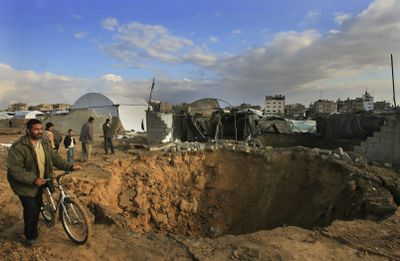Tunnels are key factor in attack
Arms smuggling a major concern; Egypt has responsibility for policing

RAFAH, Egypt – Some of them are said to be big enough to accommodate railroad cars. They may reach a depth of 50 feet, and are reported to be equipped with cables and electric motors that move food, fuel and probably some of the heaviest rockets that Hamas aims at Israel.
The tunnels also are one of the main reasons fighting is continuing in the Gaza Strip.
As Israeli officials debate how far to press their campaign in Gaza, one of their chief goals is to find a way to crimp the flow of arms to Hamas through a complex of tunnels under the territory’s border with Egypt.
While ground forces battle Hamas in the streets, Israeli warplanes pummel targets in Gaza near Rafah, the coastal town that straddles the Gaza-Egypt border. Israel’s demand to block arms shipments through the “Philadelphi corridor,” the strip of land separating Gaza and Egypt, is a central point in cease-fire talks.
“The tunnels are important, probably to the point that a preponderance of weapons have come through those tunnels,” said a senior U.S. military official who has seen classified intelligence reports on Hamas arms flows.
For residents of Gaza, however, the tunnels bring far more than arms. The territory’s borders have largely been sealed since Hamas took control in 2007. The tunnels are the main conduit for commerce and a lifeline for food and medicine.
Smuggling through the tunnels is also a primary source of income for Bedouin tribes long neglected by the central government. One smuggler, who gave his name as Abu Mohammed, said that gasoline and food make up the bulk of his business.
Palestinians involved in cease-fire negotiations want to see the overland border with Egypt reopened.
“As long as there’s a blockade around Gaza, the tunnels will remain,” Mohammed said.
Israeli military officials and politicians see the blocking of the tunnels as a prerequisite to any cease-fire.
Yossi Peled, a general in the Israeli reserves and former head of the Israeli Defense Force’s northern command, said last week on Israeli radio that if the arms smuggling isn’t stopped, “then one might very well ask why it was that we embarked on this war to begin with.”
Mohammed said that Israel’s airstrikes had damaged up to 60 percent of the tunnels, but that the damage can be repaired easily. He said the tunnels range in depth from 12 meters to 15 meters, and that Israeli missiles can only penetrate to a depth of 7.5 meters.
As a result, U.S. and Israeli experts say any effort to shut down the tunnels is likely to focus on a diplomatic agreement with Egypt, which has shouldered the responsibility for policing the border crossing since Israel’s withdrawal from Gaza.
The growth of the tunnel network, however, has prompted critics, including some in the U.S. Congress, to doubt whether Egypt has done enough.
“The question is whether this is a matter of capability, that Egypt can’t counter these tunnels, or is it a matter of some degree of tolerance for these tunnels to demonstrate sympathy with the Palestinians?” said David Schenker, a former Pentagon official who is now a senior fellow at the Washington Institute for Near East Policy.
One of the biggest challenges facing both sides are the Bedouin clans that control the Sinai Peninsula’s sprawling smuggling networks in Egypt. The Sinai is a poor region with limited opportunities, and its Bedouins have centuries of practice in circumventing local authorities. The smuggling trade with Gaza has become crucial to the Rafah region’s economy.
Mohammed said about 6,000 people are connected to the smuggling business on Rafah’s Egyptian side, including traffickers, tunnel diggers and shop owners. Shutting this trade down, especially in a nation where more than 40 percent live on less than $2 a day, could lead to protests against the government.
Schenker said the Egyptian government has historically under- invested in the Sinai and has cut local tribes out of traditional industries like tourism, forcing many Bedouin into smuggling.
“These people are not necessarily believed to be sympathetic to al-Qaida or Hamas, but see it as a livelihood,” said Schenker. “It’s a matter of neglect and corruption.”